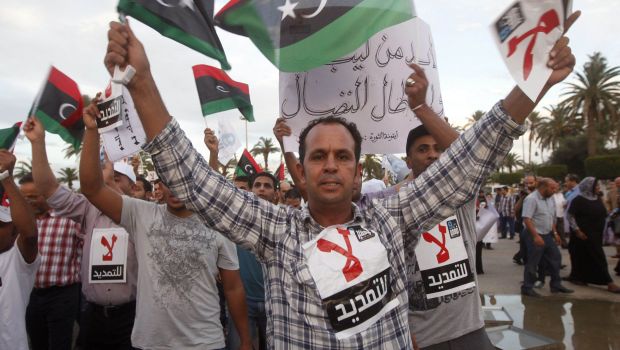
Demonstrators protest against the General National Congress (GNC) at the Martyrs’ Square in Tripoli, November 9, 2013. (REUTERS/Ismail Zitouny)
The country is also confronting an autonomy movement in eastern Libya, which on Sunday announced that it plans to set up a regional oil firm under its own exclusive control, as well as an eastern central bank. The announcement came hours after a press statement issued by Libyan Prime Minister Ali Zeidan, in which he announced his indignation at the seizure of oil fields for the sake of “political ambitions or personal interests.”
Hundreds of Libyans gathered Saturday evening in Tripoli, as well as other cities across Libya, in the birth of a new protest movement dubbed the “9 November Movement.” The protesters criticized the extension of the GNC’s tenure, which is now due to expire on February 7, 2014.
The movement calls for fresh parliamentary elections, a new election for the committee charged with drafting the new constitution, and called for a crisis government headed by an independent figure to rule Libya in the interim.
The group congregated in Shuhada’a square in the center of the capital to express their anger at the extension of the GNC’s term, whose main purpose was to prepare the country for general elections following the drafting of a new constitution, which has yet to take place.
The GNC indicated that they are likely to extend their mandate in a “constitutional declaration.”
Spokesman Omar Humeidan told Asharq Al-Awsat: “We view the demonstrations as very marginal. They seemed much grander on social networking sites and other media outlets, in comparison to what we actually saw. Our view is that that is a positive sign in support for the opposing side that argues that the Congress is not restricted to a finite period.”
“From a legal perspective, there is not a specified period of expiry for congress. Politically, there are exchanges between different political blocs,” he added.
“The National Congress, from a legal viewpoint, believes its tenure is continual. However, from a political aspect, it is trying to determine the people’s views. There is no provision for this and the constitutional declaration does not expressly provide this.”
The spokesman added “for example we established a committee for drafting the constitution, with a deadline of one month. If voting was permitted, and the constitution does not pass, should we then terminate the work of the committee? On the contrary, we should try and try again.”
Meanwhile, at a press conference on Sunday, interim prime minister Ali Zeidan said that his government four days ago received a report from the crisis committee of the National Congress, which is tasked in dealing with the seizure of oil ports in the oil crescent. He claimed that his government has begun to take executive action.
Zeidan announced that he would allow no longer than 10 days for those who have besieged oil ports to clear them, in order to lift the siege. He warned that otherwise the government will clear the area, but did not disclose details on how it intends to do so.
He added that the assassinations affecting citizens, most recently that of the Attorney General in Derna and the two policemen in Benghazi, is proof that challenges to the state’s control of the army, police and the judiciary still exists, adding: “It is a challenge to the general public, the state and the government. What Tripoli witnessed the past Thursday and Friday, from the exchange of gunfire between two armed groups is evidence of the presence of weapons external to the army and police, as well as beyond the hands of the organizational institutions of the state.”
Zeidan said: “The presence of weapons among groups, cities, tribes and families represents grave danger. Whoever thinks that possessing weapons in his home, or city, or tribe guarantees his personal safety is delusional.”
Zeidan also addressed the recent exchange of gunfire that struck Tripoli, which involved the use of heavy weapons. During the clashes gunfire struck the Hotel Al-Mihari, which currently hosts several embassies, as well Hotel Al-Wadan, the Office of the Minister of Foreign Affairs. The Italian embassy was subsequently looted.
Zeidan warned that if the situation continued foreign embassies may depart from Libya, worsening its relations with the outside world and the authority of the central government.
As well as ongoing violence in Tripoli, the continuing unrest in Libya’s second city, Benghazi, has also raised concerns about the country’s future.
Stability in the eastern region is a crucial factor in Libya’s oil exports, as the eastern half of the country accounts for 60 percent of the total Libyan oil production.

Trackbacks/Pingbacks